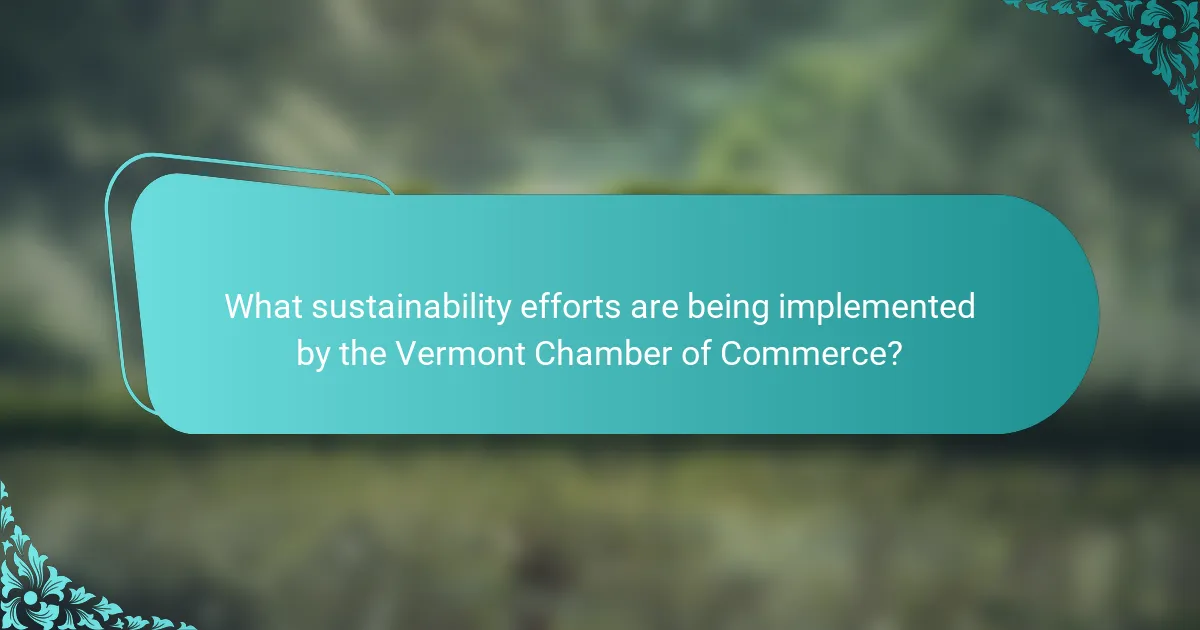The Vermont Chamber of Commerce is a key business organization dedicated to advocating for and supporting businesses in Vermont. This article outlines the Chamber’s initiatives focused on environmental sustainability and economic development, including promoting green business practices, renewable energy, and responsible resource management. It highlights the Chamber’s collaboration with local governments and stakeholders to create a sustainable business environment, as well as its efforts to enhance environmental policies through training and resources for local businesses. The Chamber’s commitment to fostering a sustainable economy is central to its mission and activities in the state.

What is the Vermont Chamber of Commerce?
The Vermont Chamber of Commerce is a business organization that represents the interests of businesses in Vermont. It provides advocacy, support, and resources to help businesses thrive. The Chamber engages in various initiatives to promote economic development and sustainable practices. It also focuses on environmental policies that benefit both businesses and the community. The organization works closely with local governments and other stakeholders to foster a sustainable business environment. Its efforts include promoting renewable energy and responsible resource management. The Vermont Chamber of Commerce plays a crucial role in shaping the state’s economic landscape while prioritizing sustainability.
How does the Vermont Chamber of Commerce support local businesses?
The Vermont Chamber of Commerce supports local businesses through advocacy, networking, and resources. It advocates for policies that benefit the business community in Vermont. The Chamber provides networking opportunities that connect local businesses with each other. It offers educational resources and training programs to enhance business skills. The Chamber also promotes local businesses through marketing initiatives. Additionally, it provides information on sustainability practices to help businesses reduce their environmental impact. These efforts collectively strengthen the local economy and foster a supportive business environment.
What programs are offered by the Vermont Chamber of Commerce?
The Vermont Chamber of Commerce offers various programs focused on business development, networking, and advocacy. These programs include professional development workshops, leadership training, and business-to-business networking events. The Chamber also provides resources for sustainability initiatives and environmental policies. Additionally, they offer support for small businesses and promote economic growth in the region. These initiatives aim to enhance the business environment in Vermont and foster community engagement.
How does the Chamber engage with its members?
The Chamber engages with its members through various initiatives and programs. It organizes networking events to foster connections among members. The Chamber provides resources and information on environmental policies and sustainability efforts. It offers workshops and training sessions to enhance members’ knowledge. The Chamber also advocates for members’ interests at the state level. Regular communication through newsletters keeps members informed about relevant updates. Surveys and feedback mechanisms allow members to voice their concerns and suggestions. These activities demonstrate the Chamber’s commitment to active member engagement.
What is the role of the Vermont Chamber of Commerce in environmental policies?
The Vermont Chamber of Commerce plays a significant role in shaping environmental policies. It advocates for sustainable business practices among its members. The Chamber promotes policies that balance economic growth with environmental stewardship. It engages in discussions with policymakers to influence legislation. The organization supports initiatives that encourage renewable energy and conservation efforts. By providing resources and education, it helps businesses adopt environmentally friendly practices. The Vermont Chamber of Commerce collaborates with other organizations to enhance sustainability efforts statewide. This involvement positions the Chamber as a key player in Vermont’s environmental policy landscape.
How does the Chamber influence state legislation on environmental issues?
The Vermont Chamber of Commerce influences state legislation on environmental issues through advocacy and policy development. It actively engages with lawmakers to represent business interests regarding environmental regulations. The Chamber provides research and data to support its positions on sustainability. It collaborates with various stakeholders to promote balanced environmental policies. This approach ensures that economic growth aligns with environmental preservation. The Chamber’s influence is evident in its participation in legislative discussions and committees. It also mobilizes member businesses to voice their opinions on relevant legislation. This collective effort amplifies the Chamber’s impact on state environmental policy.
What partnerships does the Chamber form to promote sustainability?
The Vermont Chamber of Commerce forms partnerships with local businesses, government agencies, and environmental organizations to promote sustainability. These collaborations focus on advancing sustainable practices and policies. The Chamber works with the Vermont Agency of Natural Resources to align business strategies with state environmental goals. They also partner with organizations like the Vermont Natural Resources Council to advocate for sustainable land use. Additionally, the Chamber engages with local businesses through initiatives like the Sustainable Business Initiative, which encourages environmentally friendly practices. These partnerships are crucial for fostering a collaborative approach to sustainability in Vermont.

What sustainability efforts are being implemented by the Vermont Chamber of Commerce?
The Vermont Chamber of Commerce is implementing several sustainability efforts. They focus on promoting green business practices among members. This includes initiatives like energy efficiency programs and waste reduction strategies. The Chamber also supports sustainable agriculture and local sourcing. They provide resources for businesses to adopt eco-friendly practices. Additionally, they advocate for policies that enhance environmental sustainability in Vermont. These efforts align with their commitment to fostering a sustainable economy.
How do these efforts align with Vermont’s environmental goals?
Vermont’s environmental goals focus on sustainability, reducing greenhouse gas emissions, and promoting renewable energy. The efforts of the Vermont Chamber of Commerce align with these goals by advocating for policies that support clean energy initiatives. For instance, they promote local businesses that utilize renewable resources, which helps decrease carbon footprints. Additionally, the Chamber encourages sustainable practices in industries such as agriculture and manufacturing. These practices contribute to the state’s goal of achieving 90% renewable energy by 2050. Overall, the Chamber’s initiatives directly support Vermont’s commitment to a sustainable and environmentally friendly future.
What specific initiatives have been launched to promote sustainability?
The Vermont Chamber of Commerce has launched several specific initiatives to promote sustainability. These initiatives include the “Sustainable Business Program,” which encourages businesses to adopt environmentally friendly practices. The program provides resources and support to help companies reduce their carbon footprint. Another initiative is the “Vermont Green Business Certification,” which recognizes businesses that meet stringent sustainability criteria. Additionally, the Chamber promotes renewable energy projects to enhance energy efficiency within the state. These efforts align with Vermont’s commitment to reducing greenhouse gas emissions and fostering a sustainable economy.
How does the Chamber measure the success of its sustainability efforts?
The Chamber measures the success of its sustainability efforts through specific metrics and benchmarks. These metrics include reductions in greenhouse gas emissions, energy efficiency improvements, and waste reduction statistics. The Chamber also evaluates member engagement in sustainability initiatives. Surveys and feedback from members provide qualitative data on perceived benefits. Annual reports detail progress towards sustainability goals. Collaboration with local environmental organizations enhances accountability. Additionally, the Chamber tracks participation in sustainability programs and events. All these methods contribute to a comprehensive assessment of sustainability success.
What challenges does the Vermont Chamber of Commerce face in promoting sustainability?
The Vermont Chamber of Commerce faces several challenges in promoting sustainability. Limited funding restricts the scope of sustainability initiatives. Many businesses prioritize immediate economic concerns over long-term sustainability goals. There is also a lack of awareness among some members about the benefits of sustainable practices. Additionally, varying levels of commitment to sustainability across industries create inconsistencies. Regulatory hurdles can complicate the implementation of sustainable practices. Lastly, competition from larger businesses may deter smaller members from adopting sustainability measures. These factors collectively hinder the Vermont Chamber of Commerce’s efforts in promoting a sustainable future.
How are these challenges addressed by the Chamber?
The Vermont Chamber of Commerce addresses environmental challenges through advocacy and support for sustainable practices. They collaborate with businesses to promote eco-friendly initiatives. The Chamber provides resources and training to help companies implement sustainable operations. They also engage in policy discussions to influence environmental legislation. Additionally, the Chamber organizes events focused on sustainability education. This approach fosters a community committed to environmental stewardship. Their efforts have resulted in increased awareness and adoption of green practices among local businesses.
What resources are available to overcome these challenges?
The Vermont Chamber of Commerce provides various resources to overcome environmental challenges. These resources include educational programs on sustainable practices. They also offer networking opportunities for businesses focused on sustainability. Access to grants and funding for eco-friendly initiatives is available through the Chamber. Additionally, they provide information on state and federal regulations regarding environmental policies. Workshops and seminars are organized to share best practices in sustainability. The Chamber collaborates with local organizations to enhance community engagement in environmental efforts. These resources collectively support businesses in adopting sustainable practices effectively.

What are the future plans of the Vermont Chamber of Commerce regarding environmental policies?
The Vermont Chamber of Commerce plans to enhance its environmental policies by promoting sustainable business practices. They aim to support local businesses in adopting green technologies. The Chamber will also advocate for policies that encourage renewable energy use. Additionally, they intend to collaborate with government agencies on environmental initiatives. These efforts align with Vermont’s goals for reducing carbon emissions. The Chamber’s commitment includes providing resources and training for businesses. They will focus on increasing awareness of environmental issues among members. These plans are part of a broader strategy to foster a sustainable economy in Vermont.
How will the Chamber adapt to changing environmental regulations?
The Chamber will adapt to changing environmental regulations by implementing proactive strategies. These strategies include continuous monitoring of regulatory updates. The Chamber will engage with policymakers to influence sustainable legislation. It will also provide resources and training for businesses to comply with new standards. Additionally, the Chamber will promote best practices in sustainability among its members. This approach ensures that local businesses remain competitive and compliant. The Vermont Chamber of Commerce has a history of adapting to regulatory changes effectively. This adaptability is crucial for supporting economic growth while prioritizing environmental responsibility.
What new initiatives are being considered for the future?
The Vermont Chamber of Commerce is considering several new initiatives for the future. These initiatives focus on enhancing sustainability and environmental policies. One proposal includes increasing support for renewable energy projects. Another initiative aims to promote sustainable agriculture practices among local farmers. Additionally, the Chamber is exploring partnerships with technology firms to develop eco-friendly innovations. These efforts are designed to reduce carbon footprints and promote green business practices. The initiatives align with Vermont’s commitment to environmental stewardship and economic growth.
How can local businesses get involved in future sustainability efforts?
Local businesses can engage in future sustainability efforts by adopting eco-friendly practices. They can implement energy-efficient technologies to reduce energy consumption. Participating in local recycling programs helps minimize waste. Collaborating with sustainability-focused organizations enhances community impact. Offering sustainable products attracts environmentally conscious consumers. Educating employees on sustainability fosters a culture of responsibility. Tracking and reporting sustainability metrics demonstrates commitment and progress. According to the Vermont Chamber of Commerce, local businesses that prioritize sustainability can improve their brand reputation and customer loyalty.
What best practices can businesses adopt from the Vermont Chamber of Commerce’s sustainability efforts?
Businesses can adopt several best practices from the Vermont Chamber of Commerce’s sustainability efforts. These include implementing energy efficiency measures, which can reduce operational costs. The Chamber promotes renewable energy use, encouraging businesses to transition to solar or wind power. Participation in local sustainability initiatives fosters community engagement and collaboration. The Chamber also emphasizes sustainable supply chain practices, urging businesses to source locally. Additionally, adopting waste reduction strategies aligns with the Chamber’s goals of minimizing environmental impact. These practices are supported by the Chamber’s commitment to promoting a sustainable economy in Vermont.
What steps can businesses take to align with the Chamber’s environmental policies?
Businesses can align with the Chamber’s environmental policies by implementing sustainable practices. They should conduct an environmental impact assessment to identify areas for improvement. Adopting energy-efficient technologies can significantly reduce carbon footprints. Businesses can also engage in waste reduction initiatives, such as recycling and composting programs. Collaborating with local environmental organizations can enhance community involvement and awareness. Regularly reviewing and updating sustainability goals ensures ongoing compliance with the Chamber’s policies. Training employees on environmental practices fosters a culture of sustainability. Finally, reporting progress to the Chamber can demonstrate commitment and accountability.
How can businesses measure their own sustainability impact?
Businesses can measure their own sustainability impact through various metrics and frameworks. They can utilize carbon footprint assessments to quantify greenhouse gas emissions. Life cycle assessments evaluate environmental impacts across a product’s life span. Sustainability reporting frameworks like GRI or SASB provide structured guidelines for disclosure. Engaging stakeholders through surveys can gauge social impact and community perceptions. Tracking resource use, such as water and energy consumption, helps identify efficiency improvements. Benchmarking against industry standards allows businesses to compare their performance. Utilizing software tools can streamline data collection and analysis. These methods provide a comprehensive view of sustainability efforts and areas for improvement.
The Vermont Chamber of Commerce is a key business organization dedicated to representing and supporting the interests of local businesses in Vermont, with a strong emphasis on environmental policies and sustainability efforts. The Chamber advocates for sustainable business practices, provides resources and educational programs, and engages in partnerships to promote economic development while prioritizing environmental stewardship. This article outlines the Chamber’s support for local businesses, its role in shaping environmental legislation, and the specific initiatives launched to foster sustainability, as well as the challenges faced and future plans for enhancing Vermont’s commitment to a sustainable economy.


